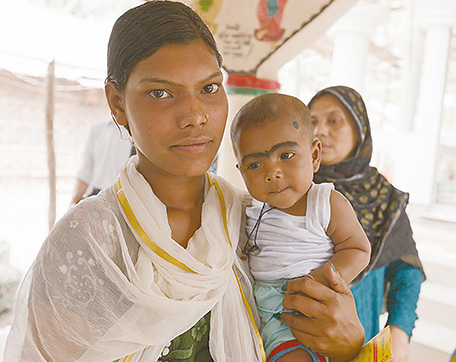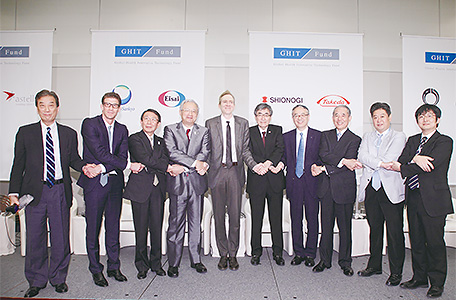Japan's Official Development Assistance White Paper 2013
ODA Topics 01
Bringing More Players to the Table for Drug Development – The GHIT Fund and Global Health
■ Establishment of the Global Health Innovative Technology (GHIT) Fund
The Global Health Innovative Technology (GHIT) Fund is Japan’s first ever public-private partnership (PPP) established to promote the research, development, and commercialization of new medical products, such as new drugs and vaccines, for the endemic diseases of developing countries. It was formed through a partnership of the Japanese government, private corporations, the Bill & Melinda Gates Foundation, and international organizations, including the United Nations (UN).
Through the GHIT fund, the Japanese government is using Japan’s drug development technology and innovation to strengthen international contributions to global health. Specifically, the government is promoting the development of new drugs by offering financial assistance for promising research in line with the Fund’s objectives.
Unlike conventional programs that offer direct aid to developing countries through the transfer of funds, technology, and so on, this novel, innovative initiative will contribute to solving the health problems of developing countries by making use of the advanced drug development technology possessed by Japan’s pharmaceutical manufacturers, research institutions, and universities. Although Japan has some of the best drug discovery technologies in the world, up until now, it has not been adequately applied to solving the problems of developing countries. The Japanese government has partnered with various organizations to create the GHIT Fund in order to use Japan’s capabilities in this field to the maximum extent possible. Through the GHIT Fund, it is anticipated that Japan will make an even larger international contribution to developing countries, while at the same time further increasing the presence of Japan in the international community.

Vaccination activities for women and children are ongoing in Bangladesh (Photo: Kaku Suzuki / JICA)
■ A Global Initiative for Global Health
Along with continued globalization, medical and health problems continue to spread beyond the concept of national borders, creating an increasing need for action at the global scale. But given the difficulty that many people in developing countries face in accessing medical institutions along with the common inadequacy of vaccine and sanitation systems, the people of developing countries are often unable to receive even basic medical care. “Global health” is a term that refers to the many health and medical problems afflicting not just one country, but multiple countries around the world. These are issues that require each country to work together for solutions. Among them, one issue that is drawing a great amount of attention is infectious disease countermeasures in developing countries.
According to the World Health Organization (WHO), there are estimated to be over one billion impoverished people in the world who are also suffering from infectious diseases such as HIV/AIDS, malaria, tuberculosis, or neglected tropical diseases (See Glossary). However, even with so many people suffering from these ailments, adequate therapies have yet to be developed in many of the developing countries where these diseases are endemic, given the lack of demand for relevant pharmaceuticals in the developed world, among other reasons. For instance, between 1995 and 2004, there were 1,556 new drugs developed throughout the world. Only 21 (1.3%) of those were created to treat infectious diseases in developing countries. To address this situation, the international community has started a number of initiatives that aim to make it possible for people in developing countries to acquire essential drugs at a lowered cost. With the GHIT Fund, Japan hopes not only to promote the development of new drugs for such diseases, but also ensure that the patients of developing countries can purchase medical products at a price they can afford through the cooperation of domestic and international pharmaceutical companies, universities, research institutions, and other groups.
The health and medical issues categorized under global health are those that cannot be solved by just one country, just one company, or just one organization. As such, there is a great need for Japan to actively partner with various international organizations and work together with those partners on problem solving initiatives. Japan must fulfill its responsibilities to the international community. To this end, the Japanese government will continue to support the initiatives of the GHIT Fund while making thorough international contributions to global health.


Founding partners of the Global Health Innovative Technology Fund exchange a firm handshake at the Press Conference for the GHIT Fund during the TICAD V. (Photo: GHIT Fund)
